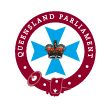-
Visit and learn
- Message from the Speaker
- About Us
- Visitors
- Visit the Public Gallery
- Visit our Gift Shop
- Have Your Say
- Get Involved
- Education and Learning
- History
- Heritage Collections
- Preservation of our Heritage
- Regional Sittings
- CPA Australia and Pacific Regional Conference
- Publications and Reports
- Speakers' Corner
- Opening of the 58th Parliament
- Parliamentary Annexe Reparation and Refurbishment
- Contact Us
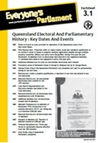
Factsheet 3.1 - Queensland Electoral And Parliamentary History
Queensland Electoral And Parliamentary History : Key Dates And Events
Suitable for: Secondary , Tertiary
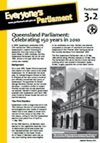
Factsheet 3.2 - Queensland Parliament: Celebrating 150 years in 2010
In 2009, Queensland celebrated Q150. This marked the 150th anniversary of Queensland’s creation following its separation from the colony of New South Wales in 1859.
Suitable for: Primary , Secondary , Tertiary

Factsheet 3.3 - Queensland Parliament Structure and Functions
According to section 2A of the Constitution Act 1867, the Queensland Parliament consists of the Queen (usually represented by the State Governor) and the Legislative Assembly.
Suitable for: Primary , Secondary , Tertiary
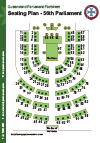
Factsheet 3.4 - Seating Plan
Suitable for: Primary , Secondary , Tertiary
View Factsheet 3.4 (PDF - 532 KB)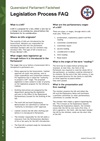
Factsheet 3.5 - Legislation Process FAQ
What is a Bill? A Bill is a proposal for a law, either a new law or a change to an existing law, placed before the Parliament for its consideration.
Suitable for: Secondary , Tertiary
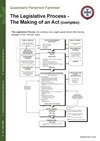
Factsheet 3.6 - The Legislative Process - The Making of an Act (complex)
The Legislation Process (for ordinary non-urgent Government Bills having passage in the ‘normal’ way).
Suitable for: Tertiary
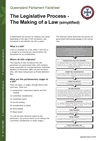
Factsheet 3.7 - The Legislative Process - The Making of a Law (simplified)
The majority of Bills introduced into the Queensland Parliament are by the Government. Ministers are responsible for introducing these Bills into the Parliament.
Suitable for: Secondary , Tertiary
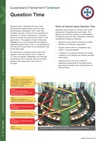
Factsheet 3.8 - Question Time
One of the most lively and politically opportunistic times during a parliamentary sitting day is Question Time. This is when the Chamber becomes a forum for the Opposition in particular, to extract information, to question and to scrutinise the policies and actions of the Government.
Suitable for: Primary , Secondary
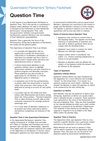
Factsheet 3.8 - Question Time
Includes information and commentary by Honorary Research Fellow Dr Paul Reynolds. A vital feature of any Westminster Parliament is Question Time.
Suitable for: Tertiary

Factsheet 3.9 - Parliamentary Committees
What is a committee? A parliamentary committee is a body established by the Parliament to inquire into specific matters.
Suitable for: Secondary , Tertiary
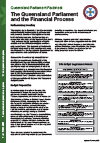
Factsheet 3.11 - The Queensland Parliament and the Financial Process
Parliamentary Scrutiny. The scrutiny by Parliament of the Government’s annual financial requirements is an important and powerful feature of the legislature’s role in Westminster systems.
Suitable for: Secondary
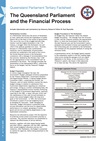
Factsheet 3.11 - The Queensland Parliament and the Financial Process
Includes information and commentary by Honorary Research Fellow Dr Paul Reynolds. Parliamentary Scrutiny In a Westminster democracy the power of
Parliament to raise, spend and oversee the expenditure of public finance lies at the heart of the system of government.
Suitable for: Tertiary
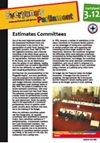
Factsheet 3.12 - Estimates Process
One of the most important powers that the Queensland Parliament holds over the Government is the control of the appropriation of public funds (Supply) from the public accounts.
Suitable for: Secondary
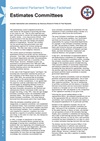
Factsheet 3.12 - Estimates Committees
Includes information and commentary by Honorary Research Fellow Dr Paul Reynolds. The parliamentary system originated primarily to raise money for the purposes of governing and often to levy taxes for war.
Suitable for: Tertiary

Factsheet 3.13 - The Office of the Speaker
Includes information on the procedural and ceremonial duties of the Speaker of the Legislative Assembly and Speakers since 1859.
Suitable for: Primary , Secondary , Tertiary
Factsheet 3.14 - Role of the Opposition
The Opposition in Parliament. The Opposition constitutes the second largest political party or coalition of parties in the Legislative Assembly.
Suitable for: Primary , Secondary
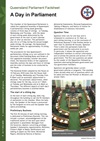
Factsheet 3.15 - A Day in Parliament
The chamber of the Queensland Parliament is called the Legislative Assembly of Queensland. The Queensland parliament usually sits for three days a week, from Tuesday to Thursday, with the dates of each sitting week determined by the Government at the start of each calendar year or after an election.
Suitable for: Secondary , Tertiary
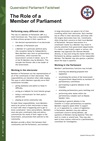
Factsheet 3.17 - The Role of a Member of Parliament
The role of a Member of Parliament is a multifunctional one. They have a responsibility to three primary groups in their capacity as the elected representative for their electorate.
Suitable for: Secondary , Tertiary
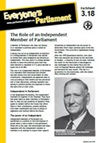
Factsheet 3.18 - The Role of an Independent Member of Parliament
A Member of Parliament who does not belong to or represent a political party is called an Independent. A person can run as an independent at elections or a sitting Member of Parliament may decide to revoke their party allegiance and become an independent.
Suitable for: Secondary , Tertiary
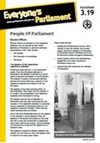
Factsheet 3.19 - People Of Parliament
Elected Officers. Elected officers are Members of the Legislative Assembly who are elected by their fellow Members of Parliament to perform traditional parliamentary roles.
Suitable for: Secondary , Tertiary
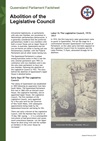
Factsheet 3.20 - Abolition of the Legislative Council
Unicameral legislatures, or parliaments with only one chamber, are uncommon in Westminster parliamentary democracies. It is generally considered that the preferred parliamentary model is two chambers with both a Lower House and an Upper House of review.
Suitable for: Secondary , Tertiary

Factsheet 3.21 - Opening Of Parliament
An Opening of Parliament is a significant event in the parliamentary calendar. The proceedings are important constitutionally but are also colourful and dignified, with an accompanying sense of occasion which the event warrants.
Suitable for: Secondary
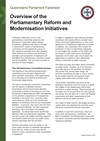
Factsheet 3.22 Overview of the Parliament Reform and Modernisation Initiatives
Following a bipartisan review of the parliamentary committee system by the Parliament’s Committee System Review Committee, significant and historic changes to Queensland’s system of parliamentary committees and the legislative process of the Legislative Assembly have been adopted.
Suitable for: Secondary , Tertiary
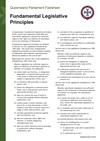
Factsheet 3.23 Fundamental Legislative Principles
In Queensland, fundamental legislative principles (FLPs) require that legislation (both Bills and subordinate legislation) should have sufficient regard to the rights and liberties of individuals and to the institution of Parliament.
Suitable for: Secondary , Senior Public Servants , Tertiary

Factsheet 3.24 Voting in the Queensland Parliament
In the Queensland Parliament, all questions are decided by members of Parliament voting.
Suitable for: All levels
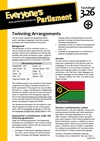
Factsheeet 3.26 - Twinning Arrangements
This fact sheet explains the Queensland Parliament’s twinning arrangements with the Vanuatu and Papua New Guinea National Parliaments.
Suitable for: Secondary
